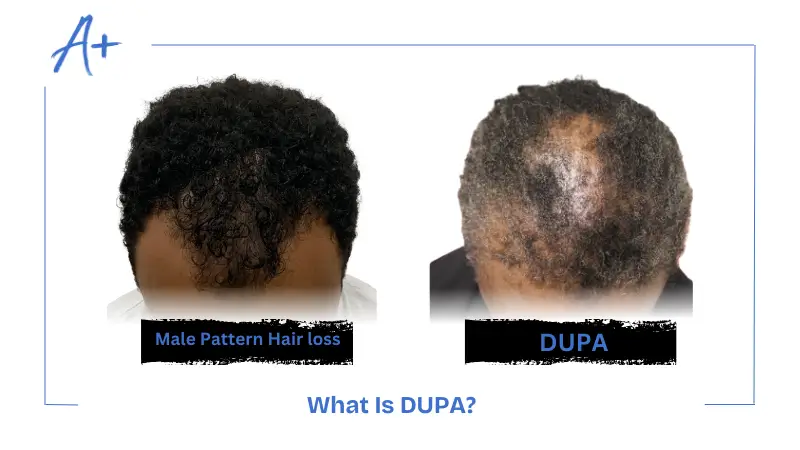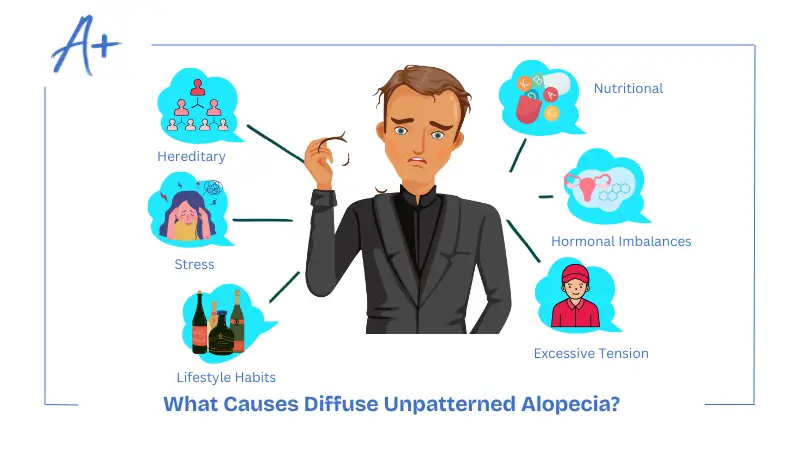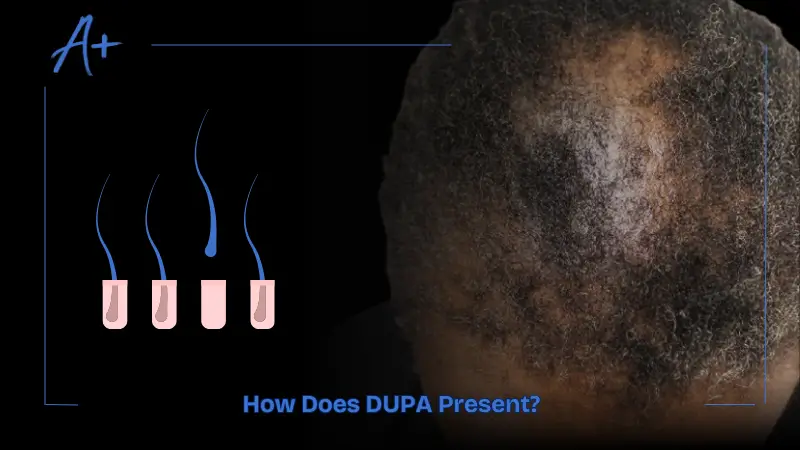Are you stressing about thinning hair and overall head balding? This is your expert guide to diffuse unpatterned hair loss. Hair loss is a common concern among people of different age groups, especially males.
With only 2-6% of all hair loss patterns in males DUPA is the least common type of hair loss yet the most challenging one to deal with.
In this article we will cover all aspects of DUPA including causes, symptoms, diagnosis and management.

DUPA is an acronym for diffuse unpatterned alopecia. As the name suggests, it is a type of hair loss that occurs without following any specific balding pattern. It can be present throughout the scalp with miniaturized hair follicles and sparse hair, or it can be focused with hair thinning in one area more than another.
How Is DUPA Different From Other Types Of Balding?
In different types of alopecia, hair loss comes in specific patterns. For example in male pattern baldness, most of the hair loss occurs on the front and top of the head, white the sides and back are spared. Hair transplant works best for hair restoration in such cases.
However, in diffuse unpatterned balding, alopecia occurs throughout the scalp, alongwith with overall hair thinning and shortening.
What Causes Diffuse Unpatterned Alopecia?

Several factors can cause diffuse hair loss. Here are some key reasons:
- Hereditary: DUPA mostly runs in the family. While a genetic predisposition is commonly associated with extensive unpatterned alopecia, sporadic cases without a familial link have also been reported.
- Stress: Both mental and physical stress are strongly connected to widespread hair loss. Conditions such as anxiety, depression can deprive the body and hair of essential nutrients, causing overall hair loss.
- Lifestyle Habits: Sedentary lifestyle, smoking, alcohol, drugs and unhealthy eating habits all contribute to the weakening of hair follicles and hair shedding.
- Nutritional Deficiencies: A strict vegetarian diet or diet composed mainly of fast food lacks essential nutrients and vitamins necessary for hair growth and maintenance.
- Hormonal Imbalances: In females, hormonal triggers play an important role in unpatterned diffuse hair loss. Women with hormonal imbalances like PCOS, post pregnancy and post menopausal conditions often experience hair growth retardation and hair loss.
- Excessive Tension on Head: Tight hair styles such as braids or high ponytails, along with tight bandanas, hats, caps, and hijabs can cause extreme tension on hair follicles, leading to tugging and dragging.
- Iron Deficiency: Iron and vitamins deficiencies can cause hair fall, hair thinning and halt new hair growth causing diffuse alopecia.
- Thyroid Diseases: Hypothyroidism and hyperthyroidism both cause excessive hair shedding and slow down the hair growth. These conditions also distort the hair texture making them brittle and dry.
- Autoimmune Diseases: Like alopecia areata, lupus, psoriasis can cause patchy hair loss and diffuse hair thinning.
How Does DUPA Present?

Diffuse unpatterned alopecia does not follow a specific hair loss pattern and can affect both men and women. Here how it presents:
- Scattered hair loss involving whole scalp
- No specific hair loss pattern
- Hair thinning throughout its length
- Hair shortened in length
- Miniaturized hair follicles
- Lack of hair density
- Minimal head coverage by hair
- Progressive and worsening hair loss
How Is DUPA Diagnosed?

There are multiple ways to diagnose diffuse alopecia. The below mentioned tests can be combined with a physical examination by your doctor to determine the cause and devise a management plan.
- Physical Examination: Your physician and dermatologist will examine your scalp to determine its current condition.
- Blood Tests: These include general blood workup to determine any nutritional deficiency or hormonal imbalance that is causing hair loss.
- Scalp Biopsy: In some cases a small tissue is taken from your scalp and analyzed under a microscope to check the number, status and growth of hair follicles.
- Dermoscopic Examination: A specialized tool called dermatoscope is used to assess the scalp and help in diagnosing the condition.
What Are The Treatment Options For DUPA?

Hair restoration techniques like hair transplantation do not work for conditions like DUPA. It may produce transient results but not fruitful in the long term. So, it is very challenging to treat and manage diffuse unpatterned hair thinning.
- Finasteride: This oral medication lowers the DHT levels in the body and is often prescribed for men. It increases hair growth but is not suitable for women of reproductive age groups.
- Minoxidil: Minoxidil usually comes in spray form. It increases the blood flow to the hair follicles and thus maintains the hair growth.
- Hair Vitamins: Most often vitamin B7 Biotin and B complex are prescribed for hair restoration and maintenance.
- PRP: Platelet rich plasma is gaining popularity due to its increased demand and high effectiveness for hair restoration. It is injected under the skin of the scalp with sparse hair to stimulate hair growth.
- Low Level Laser: Also known as red light therapy, it uses red or near infra-red rays to stimulate the hair follicles and is suitable for both males and females.
- Anti Hair Loss Serums: Products like azelaic acid reduce DHT levels, oxidative stress and inflammation, while activating signalling pathways to encourage hair restoration.
- Scalp Messages: Frequent scalp messages if combined with essential oils increases the blood flow to the scalp and promotes follicles regeneration.
- Derma Rolling: Dermaroller specifically with the microneedles help in promoting blood flow to the bald spots and this in turn increases the hair growth.
Frequently Asked Questions
Is DUPA hair loss permanent?
DUPA hair loss is most of the time permanent but effective hair care and timely management can reverse it and prevent it from progressing further.
Does hair grow back after diffuse alopecia?
Yes, there are several options available for diffuse alopecia. Consult your doctor to help you determine the type of treatment that works best for you.
How do you stop diffuse alopecia?
If you follow proper hair care and scalp care routine along with taking essential nutrients in diet you can halt the diffuse alopecia from progressing further.
Can you have a hair transplant for DUPA?
Hair transplant does not work for DUPA in the long run. It may produce temporary results. But, as the time goes by both the recipient and the donor area gets damaged and loses hair.

